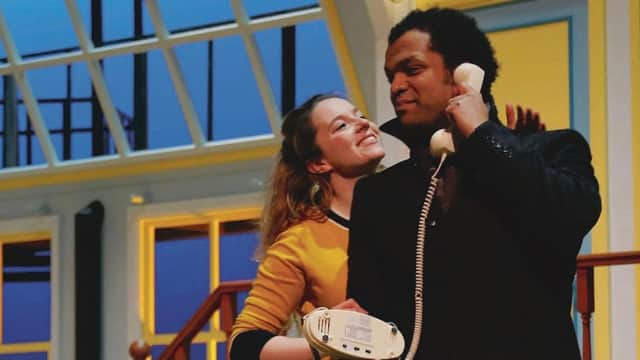Scottish theatre company hits the phones to keep lockdown blues at bay


Six weeks ago tonight, the Scottish theatre world turned out in extraordinary strength for the opening of Barefoot In The Park, Pitlochry Festival Theatre’s spring co-production with the Lyceum in Edinburgh. The play is a famously light-touch comedy, set at an optimistic 1960s moment; and the audience cheered it to the echo, already aware that this might be Scottish theatre’s last big opening night for a while.At that moment, though, few people guessed just how extensive the lockdown and its knock-on effects would be; and in financial terms, no theatre in Scotland has been harder hit than Pitlochry, which traditionally pulls off the feat of presenting a summer season of six shows featuring a season ensemble of around 14 actors – plus one-off autumn and Christmas productions – with public support that covers less than 15 per cent of its costs. The secret lies in its substantial box office income, and in the success of its beautiful riverside cafe-bar and restaurants; and these numbers – normally an asset, in giving Pitlochry a certain independence from public subsidy – mean that lockdown has robbed it of all but the basic £400,000-plus a year it receives from Creative Scotland.
The results have been seismic, ranging from the cancellation of this year’s summer season and its postponement to 2021, to the furloughing of all but eight of its staff, out of a total of almost a hundred. Given the likelihood that theatre closures will continue far beyond the UK government furlough scheme, and that audiences may be slow to return even after that, Pitlochry has also had to start redundancy discussions with some of its staff, so as not to risk finding itself, after June, with salary commitments it has no way of meeting.
Advertisement
Hide AdYet despite this traumatic financial picture, Elizabeth Newman – who arrived in Pitlochry from Bolton Octagon in 2018 – says she is absolutely determined that the theatre will survive.
“We know how important the theatre is to the whole community in Highland Perthshire,” she says. “We are the largest single employer in the area, and all our efforts at the moment are aimed at keeping redundancies to a minimum, and trying to make all these disruptions as temporary as they can be.”
For Newman, though, the task of ensuring Pitlochry’s survival goes beyond the herculean effort to keep the books straight.
“I suppose my first feeling,” she says, “was that even though the building was closed, we didn’t want people to feel that we had abandoned our audiences or the community here. So we set up our Telephone Club, where people can just sign up for somebody from the theatre company to call them a couple of times a week, just to see how they are, to talk about theatre or any other interests they may have, and generally to have good old chinwag.
“Then we also, almost immediately, launched #Light Hope Joy, which we imagined as ‘three square meals’ of useful, cheerful material from the Pitlochry company, posted online every day, at 10am, 1pm and 6pm. One of the great things we were able to do, at the beginning of lockdown, was to tell this year’s acting company that we would be able to pay their wages for the first three months of the seven-month season they signed up for.
“So within a day or so, we had made a big list of the skills and ideas available among the company – everything from origami to gardening – and started to record #Light Hope Joy contributions; and we’re now scheduled to produce more than 700 of them, from sessions full of ideas to keep children entertained at home, to some of Brecht’s amazing love poems, which I’m directing right now. And we’ve just been given permission by the Poet Laureate, Carol Ann Duffy, to record a series of her poems too.”
Advertisement
Hide AdNewman has also decided that now is the moment to start spending the separate pot of money that Pitlochry had raised for its three-year Shades Of Tay project, involving over 70 artist commissions across all art-forms, inspired by the mighty River Tay. The first round of writing commissions, announced last week, features 25 top-flight writers ranging from Jo Clifford to Timberlake Wertenbaker, all of whom will write short plays or sequences for presentation online now, and in a festival of live performance after the theatre reopens. Add new partnership talks with theatres ranging from Paines Plough to Lyth Arts Centre in Caithness, and a pending summer radio production – with BBC Arts In Quarantine – of David Greig’s new play about the Tay’s Pictish history, commissioned for the 2020 season, and you have a whirlwind of activity designed to keep Pitlochry functioning as a creative hub.
“One thing I also hope,” says Newman, “is that we will have some physical artworks from the next round of Shades of Tay visible around the theatre building when we reopen again. Because whenever that is, what’s already obvious is that the world will have changed. This is the kind of event that remains in people’s collective memories for a very long time, and we will need to acknowledge that. My feeling is we will need a lot of new work, to help us understand the new times we will be in. But whatever our audiences need, and whatever our artists want to do, my job is to make sure that somehow, this theatre will be here, trying to make that happen. The creative connections we are making during this strange time will not be going away; and believe me, neither will we.” ■
Advertisement
Hide AdPitlochry Festival Theatre #Light Hope Joy is available on Facebook, Snapchat, YouTube and Twitter (twitter.com/PITLOCHRYft. David Greig’s play Adventures With The Painted People will be on Radio 3 on 7 June